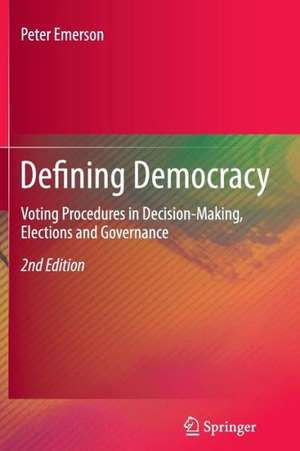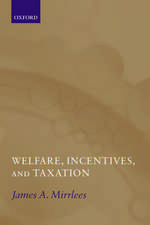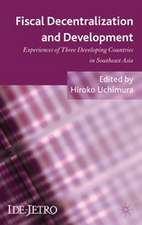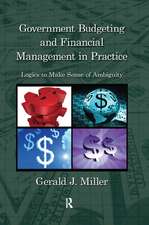Defining Democracy: Voting Procedures in Decision-Making, Elections and Governance
Autor Peter Emersonen Limba Engleză Paperback – mar 2014
| Toate formatele și edițiile | Preț | Express |
|---|---|---|
| Paperback (1) | 554.42 lei 39-44 zile | |
| Springer Berlin, Heidelberg – mar 2014 | 554.42 lei 39-44 zile | |
| Hardback (1) | 641.71 lei 6-8 săpt. | |
| Springer Berlin, Heidelberg – 7 dec 2011 | 641.71 lei 6-8 săpt. |
Preț: 554.42 lei
Preț vechi: 693.02 lei
-20% Nou
Puncte Express: 832
Preț estimativ în valută:
106.09€ • 113.45$ • 88.45£
106.09€ • 113.45$ • 88.45£
Carte tipărită la comandă
Livrare economică 14-19 aprilie
Preluare comenzi: 021 569.72.76
Specificații
ISBN-13: 9783642445682
ISBN-10: 3642445683
Pagini: 220
Ilustrații: XXVIII, 192 p.
Dimensiuni: 155 x 235 x 12 mm
Greutate: 0.32 kg
Ediția:2nd ed. 2012
Editura: Springer Berlin, Heidelberg
Colecția Springer
Locul publicării:Berlin, Heidelberg, Germany
ISBN-10: 3642445683
Pagini: 220
Ilustrații: XXVIII, 192 p.
Dimensiuni: 155 x 235 x 12 mm
Greutate: 0.32 kg
Ediția:2nd ed. 2012
Editura: Springer Berlin, Heidelberg
Colecția Springer
Locul publicării:Berlin, Heidelberg, Germany
Public țintă
GraduateCuprins
Foreword by Professor Arend Lijphart.- Part I: Decision-Making.- 1 The Myths of Majority Rule.- 2 Pluralist Decision-Maing.- Part II: Elections.- 3 "Party-ocracies".- 4 The Candid Candidate.- Part III: The Art of Governance.- 5 The Elected Dictator.- 6 Governance.- Appendices.- Chronology.- References.- Index.
Recenzii
“It is a thesis and its wide-ranging and informative overview of various forms of democratic mechanism is conducted in light of this thesis. … author clearly delights in expounding his thesis and he retains the attention of the reader throughout with engaging insights and entertaining asides. … Appendices are informative and thought-provoking and make an essential contribution to the book, further demonstrating that the author’s thesis is based on an impressively wide historical and geographical scope of knowledge on the topic.” (Katy Hayward, Representation, Vol. 51 (2), 2015)
“Peter Emerson’s book covers a range of very important issues that stretch from the theory of democracy, across decision-making procedures, to electoral systems. Hence, the book is of extreme importance for students of these areas of political science. … book is worth reading and studying. Emerson’s work is both academic treatise and ‘policy paper’ advocating new voting procedures that are very different from those commonly used and that would be highly likely to have far reaching consequences for democratic polities.” (Miloš Brunclík, Central European Political Studies Review, cepsr.com, Vol. XV (4), 2013)
“It is a handbook on how to organise democracy in different ways. Emerson describes in different kinds of electoral and governmental systems, explains how each works in practice and weighs the pros and cons of each. The result is thought-provoking guide to what democracy actually means and how best it can be achieved.” (Books Ireland, October, 2012)
“Peter Emerson’s book covers a range of very important issues that stretch from the theory of democracy, across decision-making procedures, to electoral systems. Hence, the book is of extreme importance for students of these areas of political science. … book is worth reading and studying. Emerson’s work is both academic treatise and ‘policy paper’ advocating new voting procedures that are very different from those commonly used and that would be highly likely to have far reaching consequences for democratic polities.” (Miloš Brunclík, Central European Political Studies Review, cepsr.com, Vol. XV (4), 2013)
“It is a handbook on how to organise democracy in different ways. Emerson describes in different kinds of electoral and governmental systems, explains how each works in practice and weighs the pros and cons of each. The result is thought-provoking guide to what democracy actually means and how best it can be achieved.” (Books Ireland, October, 2012)
Notă biografică
Peter Emerson is the director of the de Borda Institute, an NGO which promotes the use of inclusive voting procedures, especially in conflict zones. The child of a Southern Irish Protestant father and a Northern English Catholic mother, he has been based in Belfast for the last thirty five years. As part of this work, he has travelled extensively, observing several elections for the osce, and his latest deployment was as a translator for the eu Monitoring Mission for South Ossetia. In between such duties, he has lectured in countless universities and other institutes, throughout Europe, in East and Southern Africa, and across the United States. Since 1990 has published extensively on consesus politics in newspapers and books.
Textul de pe ultima copertă
Defining Democracy looks both at the theory of why and the history of how different voting procedures have come to be used – or not, as the case may be – in the three fields of democratic structures: firstly, in decision-making, both in society at large and in the elected chamber; secondly, in elections to and within those chambers; and thirdly, in the various forms of governance, from no-party to multi-party and all-party, which have emerged as a result.
Caracteristici
Democracy is for everybody, not just a majority - this book explains the basis of a more consensual politics Advocates more accurate voting methodologies beyond the simplistic majority rule Shows how democracy is still evolving, e.g. through the use of computer applications Outlines how consensual voting procedures can play a vital part in any peace process Includes supplementary material: sn.pub/extras

















